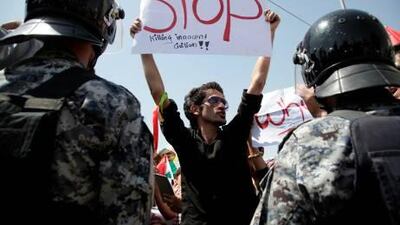ISTANBUL // Despite a wave of airstrikes in northern Iraq that has killed up to 100 Kurdish rebels in the past week, the Turkish military was facing increased pressure at home yesterday as a former chief of general staff was reported to have admitted to serious flaws in the fight against Kurdish militants.
"Our situation is a complete shame," Gen Isik Kosaner told a closed meeting of officers before his resignation late last month, according to quotes from a recording of the speech posted on the internet and carried yesterday by all major newspapers in Turkey. Neither the retired general nor the general staff or the government commented on the reported speech.
On Tuesday, the general staff said its air strikes on northern Iraqi installations of the Kurdistan Workers' Party, or PKK, a rebel group fighting for Kurdish self-rule in Turkey since 1984, had been a success. The air strikes, started after a deadly rebel attack in south-eastern Turkey on August 17, had killed 90 to 100 rebels and wounded more than 80 PKK members, the general staff said on its website. The PKK denied the claims, saying only three of its fighters had died and that at least seven civilians in northern Iraq had been killed.
The image of a modern fighting force hitting enemies beyond Turkey's borders with deadly precision was also undercut by the reports about Gen Kosaner's speech yesterday. One newspaper, Bugun, commented that the general's words were scandalous.
Tens of thousands of people have been killed and millions made homeless since the PKK, regarded as a terrorist organisation by Turkey and the West, took up arms against Ankara almost 30 years ago. Even though the number of PKK fighters is estimated at less than 5,000, the Turkish military, the second biggest fighting force in Nato after the US armed forces, has been unable to defeat the rebels.
The reported speech of Gen Kosaner offered some insight into possible reasons why that is so.
In one example, he confirmed that officers watched a PKK attack on a military outpost in south-eastern Anatolia last year almost in real-time through footage supplied by an unmanned spy aircraft in the region, but failed to mount a quick response due to "a lack of coordination". Seven soldiers died in the attack. At the time, the military rejected media reports about failures in connections with the incident.
The recorded speech also included complaints by Gen Kosaner about officers leaving their men during clashes with Kurdish rebels and about a lack of records about minefields in the Kurdish area. "That is very dangerous," he said about the mines. "Who buried the mines? It was us." In another part of the speech the general said ten people stepped on mines. Gen Kosaner also said a lack of training had led to soldiers being killed by friendly fire.
In a country that has long worshipped its armed forces and where civilian control over the military has been much weaker than in countries of the European Union, which Turkey wants to join, the reported speech became the number on item in many news outlets yesterday. "Unbelievable confessions", ran the headline of the Zaman newspaper.
"It is going to erode further the image of the military," Yavuz Baydar, a columnist for the Sabah newspaper and a long-time observer of Turkish politics, told The National in a telephone interview yesterday.
Referring to judicial investigations into suspected coup plots hatched within the armed forces and a series of news reports about mistakes by the military leadership in recent operations against the PKK, Baydar spoke of an "ongoing de-mythification process" regarding the Turkish military. "We are in the final stages of this process."
He said the fact that the latest revelations reportedly came from Gen Kosaner himself meant that they would be taken much more seriously than mere news reports. "The effect will be much more powerful", he said. Gen Kosaner's reported self-criticism also demonstrated that the military had to undergo big changes. "The whole story shows the huge need of reform of this institution."
Gen Kosaner resigned along with most of the other members of the former general staff of the strictly secularist armed forces last month, in protest against the arrest of hundreds of active and retired officers accused by prosecutors of taking part in coup plots against the religiously conservative government of Recep Tayyip Erdogan, the prime minister. The resignations, quickly followed by the appointment of a new general staff, were a major breakthrough for efforts by Mr Erdogan to cut back the political influence of the armed forces.
At a meeting last week, the National Security Council, which includes top government officials and the newly appointed general staff, resolved to "make the fight against terrorism more effective with the help of new strategies", according to a statement released after the meeting. Mr Erdogan has said he wants special police units take over more responsibility in the fight against the PKK. That would mean less involvement of the armed forces.
The government wants to spend 100mn lira (Dh206mn) on the purchase of 300 armed vehicles for police units in the predominantly Kurdish area of south-eastern Anatolia this year, according to news reports.

